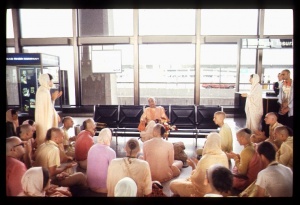CC Antya 1.144: Difference between revisions
No edit summary |
(Vanibot #0054 edit - transform synonyms into clickable links, which search similar occurrences) |
||
| Line 19: | Line 19: | ||
<div class="synonyms"> | <div class="synonyms"> | ||
''dhari-a'' | ''[//vanipedia.org/wiki/Special:VaniSearch?s=dhari&tab=syno_o&ds=1 dhari]-a'' — capturing; ''[//vanipedia.org/wiki/Special:VaniSearch?s=paḍicchanda&tab=syno_o&ds=1 paḍicchanda]-[//vanipedia.org/wiki/Special:VaniSearch?s=guṇam&tab=syno_o&ds=1 guṇam]'' — the quality of an artistic picture; ''[//vanipedia.org/wiki/Special:VaniSearch?s=sundara&tab=syno_o&ds=1 sundara]'' — O most beautiful one; ''[//vanipedia.org/wiki/Special:VaniSearch?s=maha&tab=syno_o&ds=1 maha]'' — My; ''[//vanipedia.org/wiki/Special:VaniSearch?s=mandire&tab=syno_o&ds=1 mandire]'' — within the heart; ''[//vanipedia.org/wiki/Special:VaniSearch?s=tumam&tab=syno_o&ds=1 tumam]'' — You; ''[//vanipedia.org/wiki/Special:VaniSearch?s=vasasi&tab=syno_o&ds=1 vasasi]'' — reside; ''[//vanipedia.org/wiki/Special:VaniSearch?s=taha&tab=syno_o&ds=1 taha] [//vanipedia.org/wiki/Special:VaniSearch?s=taha&tab=syno_o&ds=1 taha]'' — that much; ''[//vanipedia.org/wiki/Special:VaniSearch?s=rundhasi&tab=syno_o&ds=1 rundhasi]'' — You block; ''[//vanipedia.org/wiki/Special:VaniSearch?s=bali&tab=syno_o&ds=1 bali]-[//vanipedia.org/wiki/Special:VaniSearch?s=am&tab=syno_o&ds=1 am]'' — by force; ''[//vanipedia.org/wiki/Special:VaniSearch?s=jaha&tab=syno_o&ds=1 jaha] [//vanipedia.org/wiki/Special:VaniSearch?s=jaha&tab=syno_o&ds=1 jaha]'' — as much as; ''[//vanipedia.org/wiki/Special:VaniSearch?s=ca&tab=syno_o&ds=1 ca]-[//vanipedia.org/wiki/Special:VaniSearch?s=idā&tab=syno_o&ds=1 idā]'' — being disturbed; ''[//vanipedia.org/wiki/Special:VaniSearch?s=palāemhi&tab=syno_o&ds=1 palāemhi]'' — I try to escape. | ||
</div> | </div> | ||
Latest revision as of 19:25, 19 February 2024

A.C. Bhaktivedanta Swami Prabhupada
TEXT 144
- dhari-a paḍicchanda-guṇaṁ
- sundara maha mandire tumaṁ vasasi
- taha taha rundhasi bali-aṁ
- jaha jaha ca-idā palāemhi
SYNONYMS
dhari-a — capturing; paḍicchanda-guṇam — the quality of an artistic picture; sundara — O most beautiful one; maha — My; mandire — within the heart; tumam — You; vasasi — reside; taha taha — that much; rundhasi — You block; bali-am — by force; jaha jaha — as much as; ca-idā — being disturbed; palāemhi — I try to escape.
TRANSLATION
" 'O dearly beautiful one, the artistic loveliness of Your picture is now impressed within My mind. Since You are now living within My mind, wherever I wish to run because I am agitated by impressions of You, I find that You, O My friend, are blocking My way." '
PURPORT
This verse (Vidagdha-mādhava 2.33) is written in the Prakrit language, not in Sanskrit. When transformed into Sanskrit, it reads as follows:
- dhṛtvā praticchanda-guṇaṁ sundara mama mandire tvaṁ vasasi
- tathā tathā ruṇatsi balitaṁ yathā yathā cakitā palāye
The meaning is the same, but the native language is different. It was spoken to Kṛṣṇa by Madhumaṅgala as he read Him a letter from Śrīmatī Rādhārāṇī.